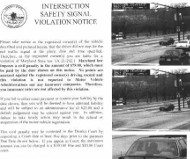Article from: www.thenewspaper.com/news/43/4380.asp
4/9/2014
California Man Sues Insurance Agency Over Camera Ticket Points
Motorist falsely accused of receiving a red light camera ticket sues insurance company over license points.
 Insurance companies make hundreds of millions of dollars from red light camera tickets in states such as California that impose points on recipients of the automated $500 fines. Each license point represents the potential to collect hundreds of dollars in increased insurance premiums over the course of several years. When California motorist Lawrence E. Armstrong was hit with a massive insurance premium hike over an offense he did not commit, he filed a lawsuit against his insurance company for its misuse of the Department of Motor Vehicle (DMV) data.
Insurance companies make hundreds of millions of dollars from red light camera tickets in states such as California that impose points on recipients of the automated $500 fines. Each license point represents the potential to collect hundreds of dollars in increased insurance premiums over the course of several years. When California motorist Lawrence E. Armstrong was hit with a massive insurance premium hike over an offense he did not commit, he filed a lawsuit against his insurance company for its misuse of the Department of Motor Vehicle (DMV) data.
The suit alleges the photo ticketing company American Traffic Solutions (ATS) and Amco Insurance violated the federal Driver's Privacy Protection Act and the Gramm-Leach-Bliley Financial Services Modernization Act that governs the privacy of personal information in financial transactions by scouring records looking for potential rate hikes without having any system in place to prevent mistakes.
"[Amco Insurance] is motivated to create amongst their pool of named insured people, a list of people who they can hike insurance premiums on, without regard to the accuracy of the factual basis for that increase in premium, all of which is in violation of each and every one of the statutes referenced above and incorporate herein by reference as if fully restated," Armstrong's lawyer, Robert D. Conaway, wrote in his complaint.
On March 13, 2013 Armstrong realized that his insurance rate went up, though he was never issued a red light camera ticket. Instead, the insurance company counted against him a ticket that was issued to another man named Lawrence Armstrong who has a different middle name.
The red light camera ticket in question went to a black man driving a Mitsubishi who was driving in San Bernardino. Armstrong is white and does not own a Mitsubishi. He lives in a different city at a completely different address. Despite the obvious mistake, Armstrong was told he had no other remedy but to sue.
"The unlawful conduct of insurer defendant... has legally caused hardship and legally cognizable injuries, which for plaintiff included an appearance in court to protest his being connected to the violation and being told he needed to file an identity theft complaint," Conaway wrote. "There was nothing the court would do as the fine had been paid and the matter was closed."
Armstrong seeks compensation for his losses, along with attorney's fees and interest.
 Insurance companies make hundreds of millions of dollars from red light camera tickets in states such as California that impose points on recipients of the automated $500 fines. Each license point represents the potential to collect hundreds of dollars in increased insurance premiums over the course of several years. When California motorist Lawrence E. Armstrong was hit with a massive insurance premium hike over an offense he did not commit, he filed a lawsuit against his insurance company for its misuse of the Department of Motor Vehicle (DMV) data.
Insurance companies make hundreds of millions of dollars from red light camera tickets in states such as California that impose points on recipients of the automated $500 fines. Each license point represents the potential to collect hundreds of dollars in increased insurance premiums over the course of several years. When California motorist Lawrence E. Armstrong was hit with a massive insurance premium hike over an offense he did not commit, he filed a lawsuit against his insurance company for its misuse of the Department of Motor Vehicle (DMV) data.